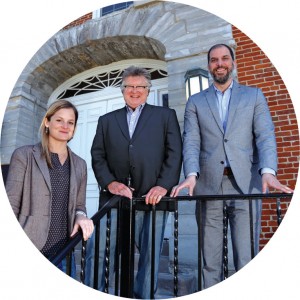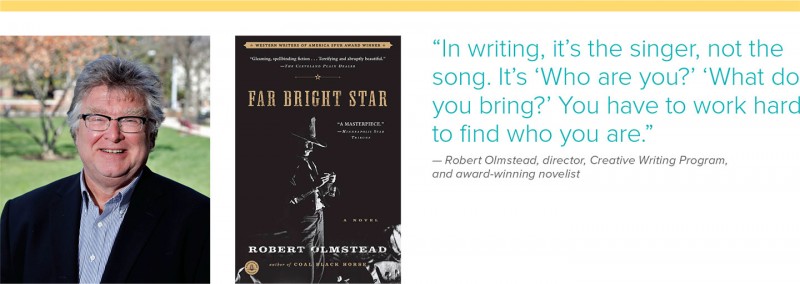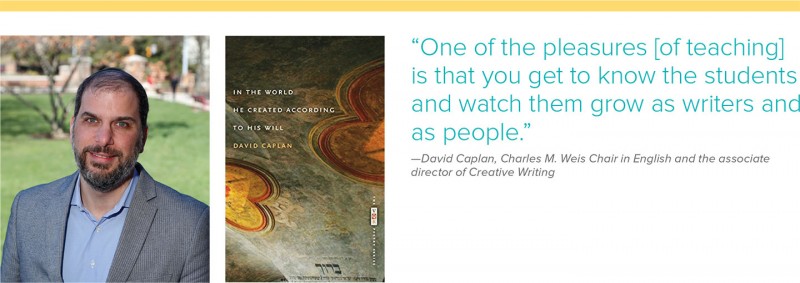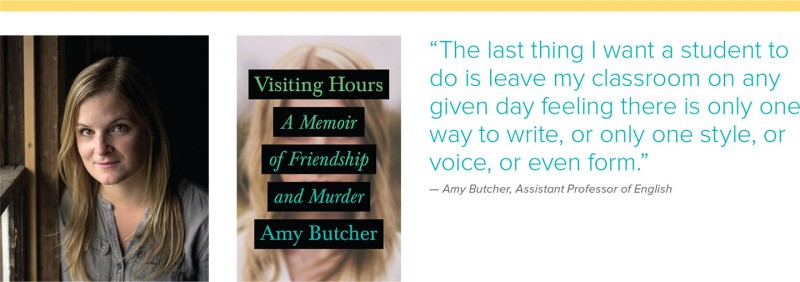
A Launching Pad for Writers
OWU’s rich history in creative writing has begun a new chapter, with a team of faculty authors mentoring a new generation of students hoping to launch careers as writers and explore the real final frontier—the human heart.
 A liberal arts education, at its best, enlightens us to our lived experience. How do we make sense of ourselves and our lives? How do we make meaning?
A liberal arts education, at its best, enlightens us to our lived experience. How do we make sense of ourselves and our lives? How do we make meaning?
Such exploration lies at the core of being a writer, too.
The best part about being a writer is that you get to explore this vast spectrum of life, blatantly and in great detail. Maybe today you’re trying to understand mass shootings. Or maybe you’re grieving the death of a friend. Or maybe you’re about to begin a great adventure. Or maybe you feel that you’re going nowhere at all.
The liberal arts tradition at Ohio Wesleyan may be the perfect environment for exploring big and complex issues—and for learning to become a writer.
For decades, Ohio Wesleyan has been producing successful writers in a variety of genres. And creative writing faculty at OWU have been inspiring students while also producing an impressive library of creative work. It’s a special program that epitomizes The OWU Connection by encouraging students to think about big questions across the disciplines—and to put theory into practice through workshops, travel-learning classes, and residencies where students write, write, and write some more.
The program has been on an extremely successful run over the past few years, with graduates entering prestigious M.F.A. programs and publishing their work—and with faculty earning national and international recognition (and even movie deals) for their creative output.
The Writer’s Challenge
A writer is an explorer of the psyche and the soul.
Robert Olmstead, Director of the Creative Writing Program, says he uses his fiction writing workshops to “challenge the writer to find their own mind, find their own thoughts.”
“It’s the singer, not the song,” says Olmstead, “It’s ‘Who are you?’ ‘What do you bring?’ ‘What is your pallet and what do your brushstrokes look like?’ You have to work hard to go down and find who you are.”

Poet David Caplan, the Charles M. Weis Chair in English and Associate Director of Creative Writing, says his goal is to get students to be “extremely clear and expressive of the conflict they’re exploring.”
But how do they prepare students for the hard work of digging down and finding who they are? And how do they help formulate and articulate those discoveries into work that can move a reader?

The Writer’s Internship
According to Caplan, the creative writing department has two functions: “One, to teach and nurture the talent of the student; and two, to give the students exposure to the wider literary world by bringing in top writers.” He says many assignments “compel students to try different things.”
“My workshops with Caplan and Olmstead were critical in my development as a writer,” says Anni Liu ’13. “I had deadlines, many readers, and engaged and available professors whose feedback I valued.”
The newest addition to OWU’s creative writing faculty is nonfiction specialist Amy Butcher, a graduate of the Iowa Writer’s Workshop. Her first book, Visiting Hours: A Memoir of Friendship and Murder, published last year, received praise and starred reviews from The New York Times, NPR, and many others.
Butcher, Assistant Professor of English, says the ultimate goal, across all genres, is to expand students’ sense of what is possible within language, and for themselves.
“In my introductory course, we study and try our hand at some eight or nine unique essayistic forms—the personal essay, narrative essay, lyric essay, braided essay, collage essay, stream-of-consciousness essay, even multimedia essays that employ audio and visual elements and animation,” says Butcher. “Reading is everything, and the last thing I want a student to do is leave my classroom on any given day feeling there is only one way to write, or only one style, or voice, or even form.”

While helping a student become a professional writer can seem daunting, Olmstead says, “The three of us recognize it can be an extremely long internship. We create that space, that place where people can be inside of. It doesn’t have a beginning and an end. It’s ongoing.”
The faculty’s hard work pays off. They change lives.
Martha Park ’11, received her M.F.A. from Hollins University. She received the Melanie Hook Rice Award for Creative Nonfiction, and her writing has been published in several literary magazines and on NPR’s On Being website. This past spring she was the Philip Roth Writer-in-Residence at Bucknell University’s Stadler Center for Poetry.
Park discovered her Hollins M.F.A. program “somewhere between reading Natasha Trethewey in Professor Caplan’s class, and Annie Dillard in Robert Olmstead’s class. I knew wherever these women had studied writing was a place I wanted to go, too.” She says, “The books and writers I encountered at OWU, in both literature and creative writing classes, were hugely important to me and continue to inform my reading and writing.”
Anni Liu says she originally intended to study neuroscience, but at the end of her first semester of poetry writing, “Professor Caplan asked me what I wanted to do with my life, and I said what I’d always known but was afraid to say: I want to be a writer. Or maybe, I said, novelist. And he asked me why I wasn’t signed up for a writing workshop.” Today, Liu is an MFA candidate in poetry at Indiana University.
Prize-winning poet Maggie Smith ’99 gained a vast national and international audience earlier this year, when her poem “Good Bones” was shared by thousands across the Internet after the Orlando massacre. The poem, which begins “Life is short, though I keep this from my children,” was published online by the literary journal Waxwing shortly after the Orlando shooting, and it quickly went viral as people everywhere reflected on the tragedy.
I was writing before I started at Ohio Wesleyan, but I think I started becoming a writer at OWU—thanks almost entirely to the mentorship and encouragement I received from my professors.
Prize-winning poet
Smith, who has published three collections of poetry and three chapbooks, says OWU was the turning point for her. “I was writing before I started at Ohio Wesleyan, but I think I started becoming a writer at OWU—thanks almost entirely to the mentorship and encouragement I received from my professors, especially Robert Flanagan.” Flanagan retired in 2002 after serving 32 years as director of creative writing, and today, the Robert Flanagan Prize in Creative Writing is awarded annually to the student who submits the best original work in fiction and poetry.
The prize was established in 1998 by Ann Neitzel Yackel ’78, who publishes under the pen name Ann Heath. A former student in Flanagan’s poetry workshop, she created the prize to recognize Flanagan’s contributions to the creative writing program and his exceptional teaching and student mentoring.
Smith has tried to carry on that tradition in her own work teaching poetry to advanced writers. She emphasizes “the idea of poetic identity, asking students to consider—and to challenge—the subjects, styles, and formal choices they return to again and again. And thanks in no small part to my experience at OWU, I focus on taking risks and trusting your instincts.”
Setting an Example
Students learn the craft of writing through practice and criticism, but they also learn through example. And OWU’s creative writing faculty provide their students with great “do-as-I-do” as well as “do-as-I-say” models.
“I don’t hide how much this means to me,” says Olmstead, “I don’t ask them to do anything I don’t ask of myself. I torment them. I torment myself.”
The three faculty members, ranging from early, mid, to late career, exemplify a diverse range of interests and aesthetics.
Following the success of her 2015 memoir, Amy Butcher published an op-ed piece in The New York Times that literally shook up one of the world’s largest corporate giants. In “Emoji Feminism,” she hilariously lamented the dearth of positive female role models in Google’s emojis. Within several weeks, Google introduced 13 new female emojis to better represent women in the workforce—and they credited Butcher’s article for inspiring their new images of strong, professional women.
“My editor said that really never happens—that those who incite change cite the inspiration,” Butcher says. “So I was really amazed and in disbelief.”
Butcher has received numerous prizes and awards, and one of her pieces was recently selected for inclusion in Best American Travel Writing 2016. She is currently at work on a novel and a longer nonfiction narrative.
David Caplan is currently working on his next collection of poetry and writing American Poetry: A Very Short Introduction for Oxford University Press. He is a contributing editor to the Virginia Quarterly Review and Pleiades: A Journal of New Writing. He has written four books and has received numerous awards for his poetry and criticism, alongside twice serving as a Fulbright Lecturer in American Literature at the University of Liège.
Robert Olmstead, the recipient of numerous prizes and awards, including a Guggenheim fellowship and an NEA Grant, is currently at work on his fifth novel. And his fourth novel has him on the verge of reaching a massive audience. Far Bright Star, came out in 2009 to wide praise by critics; the Boston Globe, for instance, wrote, “It’s the kind of novel that you will want to read once simply for the storytelling. . . . Then you will want to read it again to let Olmstead’s prose wash over you. It’s as muscular, sturdy, well hewn, and wise as the coal-black horse himself.”
Then late in 2015, Olmstead learned that the novel would be made into a movie, directed by Casey Affleck and starring Joaquin Phoenix.
Beyond the Classroom
The faculty also regularly invite America’s best writers to campus, where they give readings and meet with students.
“In my two years here, I’ve already had the opportunity to engage my students with New York Times bestselling authors and MacArthur ‘Genius’ grant recipients Leslie Jamison and Ta-Nehisi Coates, as well as Alissa Nutting, Traci Brimhall, Maggie Smith, Jennifer Percy, Adam Kirsch, and Kerry Howley,” says Butcher.
Students also are making connections out in the real world, with University-funded grants. Kate MacLam ’11, currently an M.F.A. candidate in fiction at Minnesota State University, Mankato, talks about getting “the real deal experience” when she went on a writer’s retreat in Florida with Olmstead and poet Denise Duhamel.
Meg Deeter ’17 and four other students participated in a joint Theory-to-Practice grant to attend the DisQuiet International Literary Program in Portugal with Caplan this past July.
A Legacy of Excellence, Engagement
All these recent successes carry on a long Ohio Wesleyan legacy of shaping the minds of great writers.

Richard North Patterson ’68, author of 22 novels, 16 of which were on the New York Times bestseller list, credits English Professor Robert Marshall for setting an example by being both a published author and an engaged teacher. He fondly recalls that his OWU professors “were really there to teach. The level of intellectual engagement was very high.”
Edith Hope Fine ’65, author of 18 children’s books, credits her liberal arts education for her career as a teacher. While teaching, she would read to her students and see “mental light bulbs flashing on, a deepening understanding of the world, increased confidence, and greater empathy. I saw how books offered both escape and hope to students with rough home lives.” Shortly afterward, she began writing children’s stories.
Passionate Engagement
The secret sauce for OWU’s creative writing program is the passionate engagement of both faculty and students.
Billie Paulus ’16, says Butcher is her closest mentor: “Both in workshop and outside the classroom, she has taught me, encouraged me, given me countless opportunities to have my writing promoted and circulated, as well as the many hours she has spent talking about craft with me and my ultimate writing goals.”
“It’s important for students to see an engaged writer,” Caplan says. “If you’re writing and engaged and bringing that knowledge into the classroom, then you’re showing that writing is something you value.”
He adds, “One of the pleasures is that you get to know the students and watch them grow as writers and as people.”
“I’ve been doing it for about 40 years now,” says Olmstead, “I get to go in and talk about books and writing with very committed, interested young people. There is something about young people. My generation wants to pick on them, but every semester, young people scratch out sentences on paper, sharing those stories, trying to make them better and better. It’s heartening.”
Megan Pinto ’14 is an M.F.A. candidate in poetry at Warren Wilson College. Her play “Winter in Eden” will receive its world premiere at the Purple Rose Theatre in Chelsea, Michigan, in January 2018.
